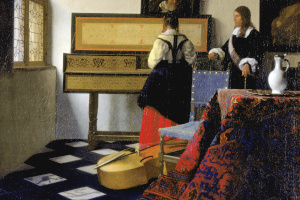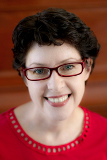A History of Classical Music
2 hours a week for 8 weeks

How do the great composers fit into history? How are they influenced by their times, and how do they influence those who come afterwards? This course explores the history of Western music, from medieval times to the 21st century, by linking musical examples to the art and society of their times. Whether you are a long-term listener or a classical beginner, this course will provide a framework for understanding the music you love.
Course Outline
Session 1: From Ancient Times to the Medieval Period
- The Elements of Music
- Ancient times
- The Medieval Period
- Hildegard of Bingen
- Interlude: The Origins of Western Pitch: Modes and Scales
Session 2: The Renaissance, 1400-1600
- Free polyphony and imitation
- The Camerata and the birth of opera
- Palestrina, Monteverdi, Josquin Desprez
- Interlude: Church music
Session 3: The Baroque Period, 1600-1750
- Baroque polyphony: counterpoint
- Continuo
- Baroque forms: canon, fugue, suite
- Motivic development
- Bach, Handel, Vivaldi
- Interlude: Hearing polyphony
Session 4: The Classical Period, 1750-1820
- The Enlightenment: order and structure
- The birth of the symphony
- The birth of the concert tradition
- The piano
- Haydn, Mozart, Beethoven
- Interlude: Classical forms
Session 5: The Romantic Period, Part 1, 1820-1850
- Romanticism: expression and emotion
- The piano virtuosos
- Nationalism
- Bel Canto Opera
- Chopin, Liszt, Schubert, Schumann, Mendelssohn
- Interlude: Lieder in the Romantic period
Session 6: The Romantic Period, Part 2, 1850-1880
- The birth of operetta
- Programme music versus absolute music
- New instruments, new sounds
- Brahms, Tchaikovsky, Wagner, Verdi
- Interlude: Programme Music
Session 7: The Impressionist Period, 1880-1920
- Impressionism: Pushing the Boundaries
- Impressionism in music
- Between tonality and atonality
- Moments rather than movement
- Puccini, Mahler, Debussy, Ravel
- Interlude: Impressionist Piano Music
Session 8: The Twentieth Century, 1920 and onwards
- An interest in folk music
- Atonality
- Serialism
- Indeterminacy
- Minimalism
- Extended tonality
- Bartok, Stravinsky, Schoenberg
- Interlude: Music Notation: Control and Creativity

Buy the course notes for this class
In hard copy book form, through Lulu Press$26 + postage
About Susan Deas
Susan Deas is a professional musician, lecturer and teacher. She has been teaching music appreciation courses for more than twenty years, through Sydney University’s Centre for Continuing Education, WEA Sydney and at other venues. Her training includes a Bachelor of Music with a major in Performance (Piano) and Musicology, a Master of Music Studies (Studio Pedagogy), a Bachelor of Arts (Communications), and an A.Mus.A in Musicianship. Susan teaches piano and music theory to adults and children, and plays piano and organ at various venues around Sydney. Susan is an Accredited Member of the Music Teachers’ Association of NSW.
More about Susan’s qualifications

